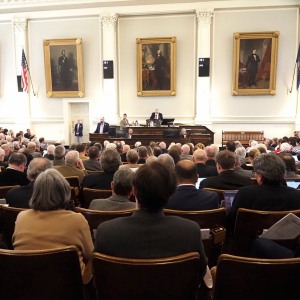Column: New Hampshire’s housing shortage needs urgent action
| Published: 10-18-2024 2:19 PM |
The New Hampshire housing market is in what economists call a state of disequilibrium — a self-perpetuating syndrome where the normal rules of supply and demand don’t work anymore. Some believe the situation will eventually correct itself. But when businesses can’t hire because housing is non-existent or beyond what even professional families can afford, waiting isn’t an option. We need intervention now.
On the Municipal and County Government Committee in the New Hampshire House, we intimately know that the housing crisis is hurting hardworking Granite Staters. That’s why I filed two bills for the 2025-2026 term which will help the system regain balance. These two bills, coined as the “Partners in Housing” and “Housing Action Act” offer incentives to developers who build starter homes, duplexes or small apartment buildings on municipally owned land. These bills lower the developer’s costs in three crucial ways: by reducing the cost of purchasing land, providing low-interest construction loans, and expediting Planning Board review. At a time when the cost of land, lengthy permitting processes and high interest rates make it impossible for modestly priced homes to “pencil out,” these bills offer developers and municipalities new ways to work together to address a key driver of New Hampshire’s housing shortage.
As the bill is now written, these programs will be administered through the Division of Business and Economic Affairs (BEA) and the New Hampshire Housing Finance Authority (NHHFA). The programs are entirely voluntary and only “communities of the willing,” as BEA Commissioner Taylor Caswell terms them, will choose to participate. Cities like Lebanon, which is already forging ahead with a similar model, will bring starter homes on line for municipal workers in the next few years.
New Hampshire’s housing imbalance is caused by a host of factors and no single solution will fix the problem. Restrictive zoning plays a part, but housing is out of reach everywhere in New Hampshire because the cost of building is just too high. Only large expensive homes or multi-unit, market rate apartment developments allow developers the opportunity a return on their investments. Lebanon Mayor Tim McNamara tells me, “We are losing our social vitality,” and that “solving this problem requires innovative thinking and close partnerships between municipalities, developers and state government.”
The “Partners in Housing” and “Housing Action Act” are designed to foster partnerships between developers and local and state governments. In the process, they will bring more starter homes on line, help businesses recruit employees, allow municipalities to increase revenues by returning under-utilized land to the tax rolls, and put more local developers across the state to work building the kinds of homes New Hampshire residents need and can afford.
New Hampshire’s housing challenges demand urgent action and creative solutions. The “Partners in Housing” and “Housing Action Act” provide a promising approach, offering incentives that lower costs for developers while fostering collaboration between municipalities and state government. These initiatives are crucial steps toward addressing the housing shortage, creating affordable options for residents, and ensuring that the state can continue to attract and retain the workforce it needs to thrive.
Rep. Laurel Stavis, D- Lebanon, is the prime sponsor of the Partners in Housing and Housing Action Act, and serves as ranking member on the House Municipal and County Government Committee.
Article continues after...
Yesterday's Most Read Articles
 ‘A bit Kafkaesque’: Federal judge spars with government lawyer over status of Dartmouth international student
‘A bit Kafkaesque’: Federal judge spars with government lawyer over status of Dartmouth international student
 NH 21-year-old dies amid the worst flu season since 2009
NH 21-year-old dies amid the worst flu season since 2009
 Hundreds of alumni sign letter urging Beilock, Dartmouth to make a stand for academic freedom
Hundreds of alumni sign letter urging Beilock, Dartmouth to make a stand for academic freedom
 After more than 45 years, Upper Valley guitar shop closes
After more than 45 years, Upper Valley guitar shop closes
 On the trail: Gov. Ayotte says she delivered on her promises in her 100 days in office. Not everyone agrees
On the trail: Gov. Ayotte says she delivered on her promises in her 100 days in office. Not everyone agrees
 Claremont City Council votes unanimously to fire city manager
Claremont City Council votes unanimously to fire city manager






 Editorial: Free speech detentions reach into Upper Valley
Editorial: Free speech detentions reach into Upper Valley Editorial: New Hampshire budget shortfall is a crisis of Republican design
Editorial: New Hampshire budget shortfall is a crisis of Republican design Editorial: Time is running out for American democracy
Editorial: Time is running out for American democracy Editorial: Jeanne Shaheen blazed a trail in politics
Editorial: Jeanne Shaheen blazed a trail in politics
